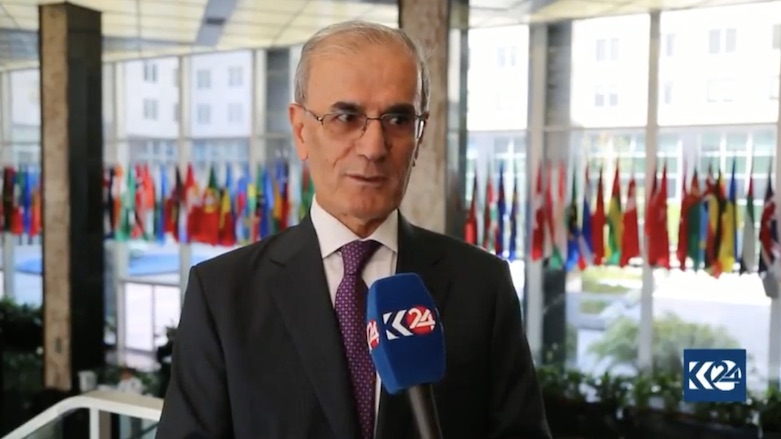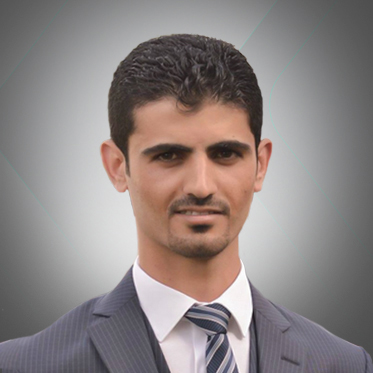Najmaldin Karim: Warns of resurgence of Islamic State, says US supports strong Kurdistan

ERBIL (Kurdistan 24) – Kurdistan 24 caught up with Dr. Najmaldin Karim at the State Department on Friday, where he had just finished meeting with US officials.
Karim is the democratically-elected Governor of Kirkuk—or at least he was, until last October, when Iraqi forces, backed by Shiite militias, attacked the city in a military operation orchestrated by Qasim Soleimani, head of the Quds Force of Iran’s Islamic Revolutionary Guard Corps.
For the first time, Karim described in English the night of Oct. 16—a night of dark drama, as he answered Kurdistan 24’s questions in the State Department’s flag-festooned entry hall.
The assault on Kirkuk was expected, Karim explained. People knew it was coming, and Karim was out with them in the city: “droves of people, thousands on the streets, expecting that there will be an attack.”
He was “talking to them” and “encouraging them to support the Peshmerga,” who had protected Kirkuk from the Islamic State (IS).
“Around midnight,” however, Karim “got a note from a reliable place that the Iranian forces,” along with the Shiite militias, would enter Kirkuk and that he was “a target.”
Thus forewarned, he began moving “from place to place,” and soon the results of a treacherous accord became apparent.
“Some elements of the PUK [Patriotic Union of Kurdistan], who had no leadership position,” had struck a deal with “the Iranians and the Shiite militias to abandon the front lines,” Karim explained.
When that happened, the “whole thing collapsed,” and Karim left the city “with tens of thousands of people.”
Some 180,000 residents of Kirkuk fled and remain displaced.
The current situation in the city is “not good,” Karim explained. “Kirkuk is really occupied by Shiite militias.”
There are also federal police, but they are “the same thing.” Iraq’s Interior Ministry is headed by a senior figure in the Badr Organization, an armed group that Tehran has supported for decades, going back to the Iran-Iraq war in the 1980s.
“The Shiite militias are part of the problem” in Kirkuk, Karim said. They arrest people” arbitrarily, without arrest warrants.
“They take money from shopkeepers,” he continued. “Nobody can run a business now, if they don’t pay a faction of the Shiite militias.”
Moreover, as Karim explained, “It’s not just one group.”
The armed organizations in Kirkuk include: Turkmen Shiite militias; Asa’ib Ahl-al-Haq, headed by Qais al-Khazali, who was involved, with Iranian support, in attacking coalition forces during Operation Iraqi Freedom; as well as the Badr Organization, to name but a few.
As far as services, like electricity and garbage collection, are concerned, Karim said, “It is a dire situation.”
In this chaos, IS is re-emerging, Karim warned. IS “never disappeared from Kirkuk.”
“When Huweija was taken by the Iraqi forces, there was no fight,” he explained. They just “went home, and they changed their clothes.”
Karim fears that “what we saw happen in Afghanistan after the Taliban were ousted” and then they came back, will also happen in Iraq.
Multiple, informed sources have told Kurdistan 24 that the US now realizes it made a serious mistake last fall, when it aligned so decisively with Baghdad against Erbil.
Although precise details are unclear, Washington had some knowledge of Iraq’s intent to seize Kirkuk, but did not move decisively to stop it. That has not turned out well, and the US is slowly moving to correct the situation, it seems.
Kurdistan 24 repeatedly asked Karim about this matter, but he declined to discuss it.
Rather, “I think the mistake” was in “regard to the referendum,” Karim said. “The strong objection from the State Department” was “a mistake, because President [Masoud] Barzani made it clear that the referendum” did not “mean a declaration of independence immediately.”
Others, including the highly-regarded US ambassador to Iraq during “the surge,” Ryan Crocker, would agree. Crocker suggested that the vociferous US opposition to the referendum encouraged Baghdad also to take a harsh stance against the Kurdish vote.
Karim affirmed to Kurdistan 24 that his “impression” is that the US supports a “strong Kurdistan.” The US “played a role” in opening the Kurdish airports, he said, “and even with the [payment of] salaries.”
“We need a US commitment to a strong Kurdistan and also to a democratic federal Iraq,” he affirmed.
The US has a major interest in what happens after the Iraqi elections, he stated: “forming a new government and naming the next prime minister.”
“I think the Kurds will have a lot to say in that,” Karim concluded.
(Kurdistan 24’s Washington DC bureau conducted the interview and Laurie Mylroie, in Washington, contributed to this report)
